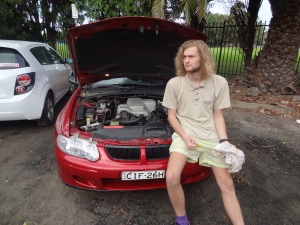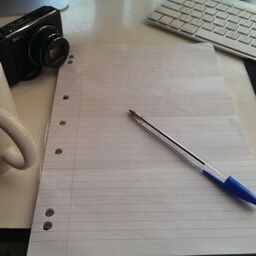Profile: Lachlan Tinnock
 Pulling to a stop at the red light at the end of the drag strip, Engines revving and the smell of burnt rubber fills the air. A flash of green and the screech of wheels as a foot lifts to release the clutch and another slams down to hit the accelerator. Launched into 170 km’s per hour over a one-quarter mile, this is the moment that Lachlan Tinnock’s years of work, and his passion filled him with adrenaline.
Pulling to a stop at the red light at the end of the drag strip, Engines revving and the smell of burnt rubber fills the air. A flash of green and the screech of wheels as a foot lifts to release the clutch and another slams down to hit the accelerator. Launched into 170 km’s per hour over a one-quarter mile, this is the moment that Lachlan Tinnock’s years of work, and his passion filled him with adrenaline.
At a young age Lachlan’s love for Cars, engines and almost anything on wheels began, as his Father and his father before him all shared the same passion. The day-to-day hobby of tinkering with engines is something that the Tinnock family has always loved, and this is no different for Lachlan. Growing up in country Australia there was no lack of room to get behind the wheel of a paddock basher and take it for a spin around the yard.
Better yet the numerous amounts of wrecks and old engines sitting around the property served as the perfect projects for young Lachlan to discover everything he could about automobiles and how they work. At only fifteen years old he had successfully completed his first engine conversion when he replaced the motor in the family’s old H.G Holden Ute with another Holden straight six. Even before this, old Postie bikes were a popular engine for Lachlan to “play around with” learning as much as he could with hands on work, dismantling and then rebuilding of engines and vehicles.
Since then Lachlan has performed multiple engine conversions including his fathers V8 Holden VK Commodore, A Toyota Corolla and a Subaru Imprexa. But Lachlan’s pride and joy is his own canary yellow 1985 VK Holden Commodore, the car his father bought him when he was 17 years old, when he was fresh on his red P plates. The car that he took down Sydney drag way as mentioned earlier. A car that he has tuned and upgraded over the years ever since it came in his possession. At this point he has a Supercharged V6 3.8 engine, from a 1998 HSV.
For Lachlan, seeing his projects improve over time is what fuels his love for cars. Experiencing new challenges, learning more each time. This constant improvement, and the gratifying feeling when you “finally get something right” is what keeps Lachlan interested in motor cars. Lachlan finds a pleasure in this day-to-day hobby as he develops his skills and knowledge of vehicles, from the small things to the big things “from changing over some lights to upgrading to new wheels”. When the time comes and Lachlan is settled down he hopes to have his own property and paddock of old cars for him to “tinker and play” and hopefully pass down his knowledge and prized cars to his children.
News story: Is journalism the right choice?

When students step out of High School into University, not all students know what career they wish to follow. Journalism is a popular guess that students undertake for a University degree. Students enrolled into a Media Communications, or Journalism degree aren’t always looking for, or 100% sure that a career in writing is what they’re after. For some students it was a rushed decision to choose a University or just convenience of being allowed entry into that degree.
Early entry is a popular way of getting accepted into a University for High School students. When high school years are near the end student’s fill out forms for early entry, ticking as many box’s as possible to increase chances as much as possible for an acceptance into any University or degree. While for some students it was a complete surprise to be accepted for a Media Communications degree, some others applied simply because of their skills in English. Alex Stefanovic is a Media Communications student who gained early entry during year 12. Her reason for applying and following the course is simply because she knew she had “strong English skills”, not because of a want to pursue a career in Journalism. When her High School years were beginning to finish, Alex felt pressured to be a part of University by Family and Friends. Media and Communications isn’t a career that Alex saw her self-getting into, and doesn’t see it as what she is meant to be doing.
Alex has greater interests in things such as Special effects or movie sets and interior design, not Journalism.
Another situation that can happen to Fresh University students, is getting into a degree that looks to be something that isn’t of great use to their life and future career. Other students such as Jess Perkins have slight interests in reporting an interviewing, and choose the degree to discover more about those interests. Even with this curiosity, the work, theory and classes still hold no real use to Jess. The final outcome doesn’t pose much help in getting Jess into music production or music writing, where her real interest and love can be explored and pursued. On the opposite side of this sits Zoe Burns who is wholly enrolled in a Media communications degree because of early entry. Zoe finds no interest and enjoyment from writing, especially the creative side of it. The only thing tying Zoe to the course is the possibility of getting involved in Environmental Journalism, where Zoe’s real interest are related to the environment.
For Codie Levien choosing Journalism was a discussion fuelled by the love for the entertainment industry, and the desire to interview the current top celebrities. Even with this interest in Entertainment, Codie felt rushed into the life of University, “people in my ear telling me it would be dumb to miss the opportunity to go to University”. Codie dream to have a job related with entertainment but is still enrolled in a course she isn’t sure she wants to pursue.
Aggregation post 2: Jobs for Graduates.
Graduating out of University everyone is looking for the same thing, work. A constant thought sitting in the back of every Journalism student’s mind is “will I be able to find work after this degree”. No student wants to end up paying $1000 or plus per subject for a degree, which at the end will not be able to peruse a career to pay off a H.E.C.S debt. A lot of Journalism students all share this same concern, will they get a job. In 2013 jobs for Australian Journalists dropped 16%.
It’s a big worry for all young aspiring Journalists that lack of job opportunities is becoming a problem; completion and other factors could result in them being jobless. Not just that but also not able to live off Journalism as a career.
Around the year 2012 a large portion of Journalism jobs became redundant. And an estimation of about 1,200 journalists lost their jobs. Students throughout Universities across Australia are all faced with a struggle to get work.
Not only is there becoming less job opportunities, but there has been increases in Journalism students over the past few years (around 2007 – 2010). Competition for job opportunities is also a factor. All hope might not be lost for young Journalists looking to get in the business. If aspiring Journalists keep their skills up dated, and are trained well with technology, being able to tell compelling stories and journalism over cross media. There is still hope for them. As the Internet age is rising and changing. So to is the way in which journalism is told.
The path to making a successful career out of Journalism as a profession is a difficult one. With ambition and a keen sense of modern technology, young journalists may still be able to make a name for themselves and become well respected writes in todays modern age.
Aggregation post 1: Characters of the radio.
When the Australian person gets into their car or home and tunes into the radio today, you might here some things you wouldn’t expect. Quality and professionalism doesn’t seem to be too much of a concern.
Kyle Sandilands is a well-known character in Australian radio that is no stranger to this type of controversial radio. Examples of some of Kyle’s latest golden radio moments include offering a Male listener $1000 if he would prove on radio that he can self fellate himself, and an argument with Barnaby Joyce, over the ‘Depp’s Dogs’ situation that occurred not long ago.
Comments from the public on the Kyle Sandilands story are mixed results. Some claim that he is a fool who should be removed from the radio. Other comments say that the radio needs people like him. This incident was not the first of Sandilands controversial moments on air. There have been plenty more in the past.
Another radio personality known for his controversial moments is American radio host Larry King
The world of radio has had its fill of controversial moments, and plenty of hosts to spark these moments. Even with the some of listeners rubbishing Sandilands for the way he performs radio. The team of ‘Kyle and Jackie O’ has enjoyed some of the higher listening ratings in Australian radio over the years. Love him or hate him, the controversial radio seems to attract a high number of listeners. It just might be these controversial moments that the everyday listener craves.
Just A Bit About Me
My name is Nick and i’m a student at University of Wollongong, currently enrolled in a double degree of Journalism and Creative Arts. This blog is a online profile of my work for that degree, and maybe some other bits and pieces.
My strongest passion is for music, all kinds of music and everything to do with it. I hope to be able to pursue that passion into a career through learning as much as i can within my time at U.O.W
A Public Sphere, How we Meet People Today.
The Internet and mobile phones have drastically changed the way that people communicate, the way we socialize. Socializing and sparking up a conversation with someone use to be the way to meet to people, friends or love interests. Internet and Mobile phones have changed that. 2013 Online relationships compared to other means. There has been online dating services for a while now, but something recent that has come in the form of an App on almost every singles smart phone is ‘Tinder’. With new the new age of technology it looks like going out and meeting new people or talking to strangers has been replaced my swiping left or right. Maybe Tinder is just there for more of a one-night stand situation. Caroline Kent gave a ‘Woman’s perspective’ on Tinder. Story here. As Kent puts in her article ‘the virtual dating has come down to the simple question hot or not’. Cutting out everything else (maybe some similar interests and an about me) down to a simple yes or no. This is becoming an increasingly popular App to download on the single persons smart phone. This impacts the Public Sphere in multiple ways. Firstly it’s changing the very way people are meeting each other, changing the social groups that are being created. You may find great catch on tinder while riding the train home, but miss out on a great friend by not talking to the person next to you. Secondly it’s in the conversation between friends. One friend suggests it to another ‘why don’t you download it?’ from one friend to another then spreading through until it becomes a daily conversation of what matches each friend has for the day.  Tinder has got to the point where a man has travelled across North America using the App. Story here. Twenty four year old Daniel Beaumont Traveled 7’500 miles (about 12’070 Km’s) by getting various lifts from girls he matched with on tinder. Not only is there debate and talk about the impacts of ‘Tinder’, but also, the public Sphere is being molded and changed into a completely new thing by this App. The debate of what tinder gets you, friends, Partners or just a one-night stand. Because someone has swiped right and matched you, how big of an invitation is that. Eli Esptein explains how he downloaded tinder because of friends influence (debate from his friend group public sphere), his result is after two or more dates you will get laid. Story here. One Smart phone App cutting out the entire process of meeting someone, getting to know them and getting them to like you. Hopefully there will be other lengthy processes cut down to size by Phone Apps. Technology is changing the way that public groups are made, what Public Spheres debate about and where they are debated.
Tinder has got to the point where a man has travelled across North America using the App. Story here. Twenty four year old Daniel Beaumont Traveled 7’500 miles (about 12’070 Km’s) by getting various lifts from girls he matched with on tinder. Not only is there debate and talk about the impacts of ‘Tinder’, but also, the public Sphere is being molded and changed into a completely new thing by this App. The debate of what tinder gets you, friends, Partners or just a one-night stand. Because someone has swiped right and matched you, how big of an invitation is that. Eli Esptein explains how he downloaded tinder because of friends influence (debate from his friend group public sphere), his result is after two or more dates you will get laid. Story here. One Smart phone App cutting out the entire process of meeting someone, getting to know them and getting them to like you. Hopefully there will be other lengthy processes cut down to size by Phone Apps. Technology is changing the way that public groups are made, what Public Spheres debate about and where they are debated.